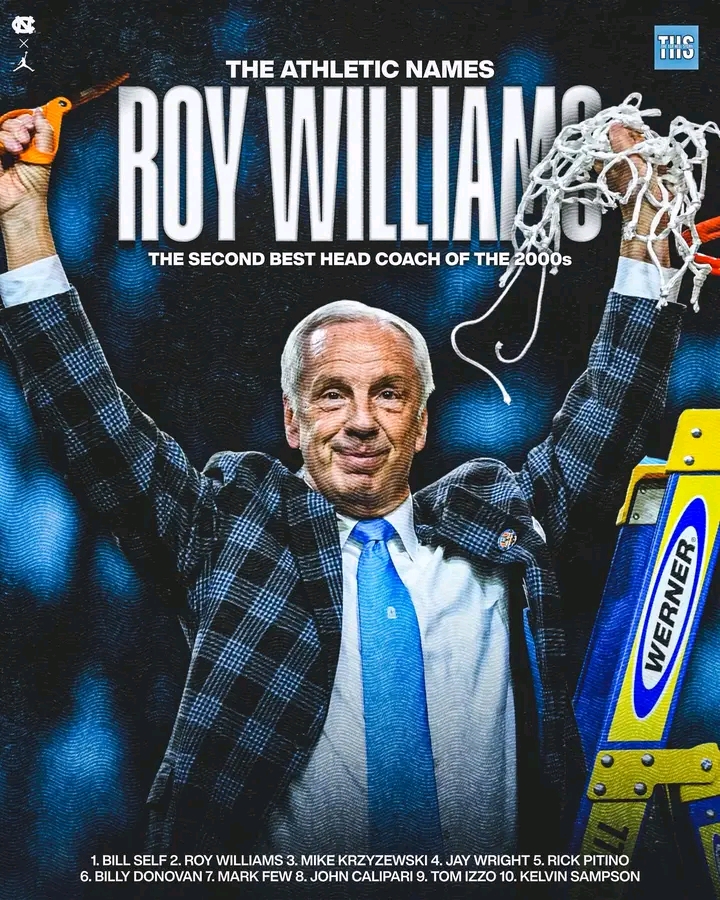In a monumental recognition that has stirred deep pride among Tar Heel faithful and the college basketball world, The Athletic has officially ranked Roy Williams as the second greatest college basketball coach of the 2000s. The announcement instantly reignited discussions about Williams’ legendary career, his unrivaled consistency, and the lasting impact he made on the game during a golden era of college hoops.
Roy Williams’ legacy is defined by excellence. From his intense courtside demeanor to his fatherly guidance behind the scenes, the former North Carolina and Kansas head coach stood as a pillar of tradition and transformation. During the 2000s, Williams carved his name in history with three national championships (2005, 2009, 2017), 9 Final Four appearances, and countless ACC and Big 12 titles, making him one of the most successful and respected figures in the sport.
Williams began the 2000s leading the Kansas Jayhawks to national prominence, taking them to back-to-back Final Fours in 2002 and 2003, including a national championship game appearance. Though he fell short of a title there, his coaching acumen and ability to develop talent were undeniable. When he returned to his alma mater in 2003 to take over the UNC program, it marked the beginning of a dynasty that would span nearly two decades.
His first championship at UNC came just two years after his arrival, in 2005. Led by Sean May, Raymond Felton, and Rashad McCants, the Tar Heels cut down the nets in St. Louis, signaling Williams’ arrival as a true titan of the sport. Four years later, he built what many consider one of the most dominant teams of all time in 2009 — a squad that ran through the NCAA Tournament with ease, winning every game by double digits.
In 2017, after the heartbreak of Kris Jenkins’ buzzer-beater in 2016, Williams and the Tar Heels returned with vengeance and resilience. They capped off an unforgettable redemption tour by defeating Gonzaga in the national title game. That third championship put Williams in rare company, tying him with legends like Bob Knight and placing him just behind Coach K and John Wooden in total titles.
Off the court, Williams’ reputation was just as sterling. Known for his humility, integrity, and old-school values, Roy always prioritized academics, relationships, and personal growth for his players. Many of his former players have gone on to become successful professionals both in the NBA and in life, often citing Williams as a guiding influence.
Throughout the 2000s, his teams were known for fast-paced, unselfish basketball, tough defense, and a relentless focus on fundamentals. Whether it was Tyler Hansbrough’s tireless motor, Ty Lawson’s speed, or Danny Green’s two-way dominance, Williams always brought out the best in his players. He wasn’t just recruiting stars — he was building teams.
What truly set Roy apart was his consistency. Year in and year out, UNC under Williams was a national contender. Even in the face of injuries, early exits, or rebuilding years, he never wavered in his commitment to excellence. That longevity and sustained success across two decades make The Athletic’s ranking more than justified — it’s a celebration of a career unlike any other.
While Coach K of Duke might have taken the top spot, Williams’ blend of class, competitive fire, and results have earned him the respect of peers, fans, and critics alike. Tar Heel Nation will forever celebrate their beloved coach, not just for the banners he hung but for the culture he built in Chapel Hill.
As fans continue to reflect on the 2000s, one truth is clear: Roy Williams wasn’t just one of the best — he was one of the most beloved. And now, with The Athletic’s ranking cementing his place in history, his legacy shines even brighter in the annals of college basketball greatness.





























